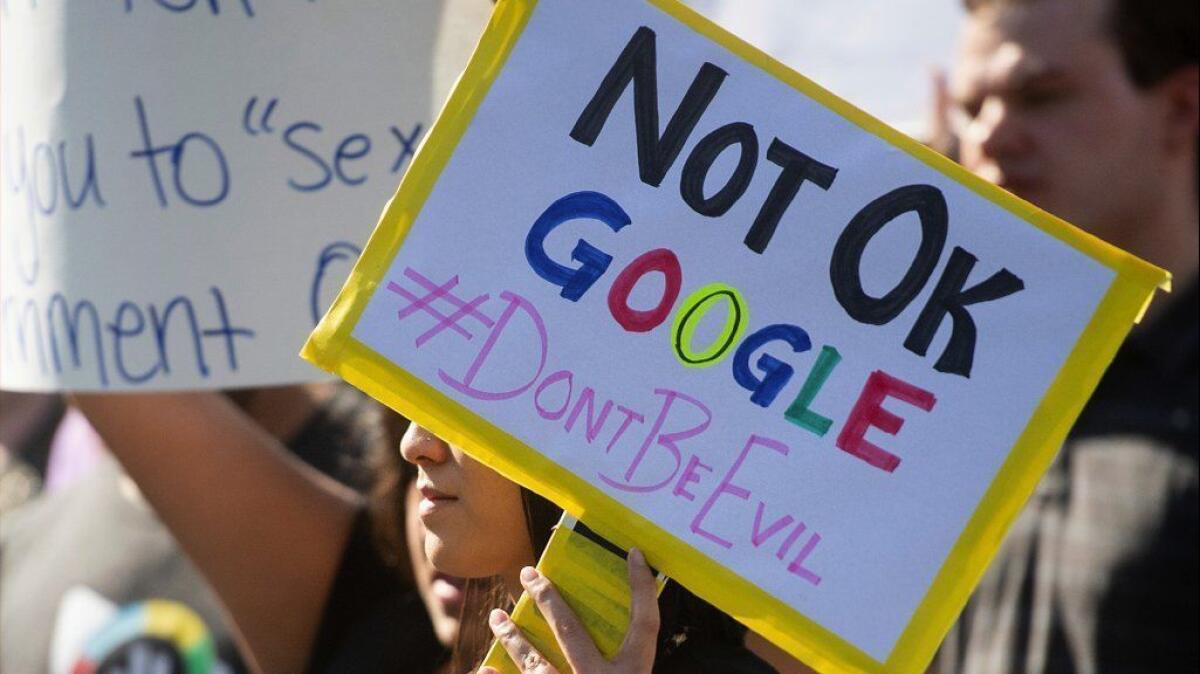Google shareholder sues board, alleging cover-up of sexual misconduct claims

When Google was revealed to have paid large severance packages to executives accused of sexual misconduct, outrage swelled, criticism piled on and employees stopped working and walked out of their offices.
Months later, the company is still dealing with the repercussions.
A shareholder on Thursday sued the companyâs board of directors, alleging they engaged in a âmulti-year scheme to cover upâ sexual harassment allegations â resulting in hundreds of millions of dollars of losses for investors.
Plaintiff James Martin claims the board âmade a conscious and intentional (and bad-faith) decision to conceal the sexual harassment at Googleâ and approved the decision to give severance packages worth millions of dollars to former star executives including Andy Rubin, known as the âfather of Android,â and Amit Singhal, who oversaw Googleâs search efforts for 15 years.
The consequences include what attorneys representing Martin estimate to be hundreds of millions of dollars in lost revenue and market cap as a result of the payouts, the subsequent reputational cost and the loss of productivity during the global walkout employees staged in November after Rubin and Singhal received those severance packages.
As confidence in public tech companies and stocks in general waver, shareholders may be eager to assign blame for the companyâs stock woes. But Google and its parent company Alphabet have been navigating a wide swath of controversies aside from its handling of harassment complaints, including now-canceled plans to build a censored search engine in China and a contract to analyze drone footage for the U.S. Department of Defense, which the company has chosen not to renew after employee backlash.
Still, the decision to stake the fiduciary claim on the companyâs alleged mishandling of sexual misconduct cases points to an increasingly mainstream view that such cases are rampant throughout the industry.
Since former Uber employee Susan Fowler told her personal account of harassment and mismanagement at the ride-hailing company, the tech industry has been grappling with the question of sexism. With the growing momentum of the #MeToo movement in Hollywood, sexual misconduct claims are getting the kind of attention they didnât before.
Now, shareholders are beginning to act on their frustration.
The lawsuit is one of the first instances in which shareholders of a major tech company took action to hold the firm accountable for its handling of sexual misconduct complaints.
Other industries are beginning to see the same sea change. CBS was sued by shareholders for its response to allegations of sexual misconduct by former Chairman and Chief Executive Les Moonves. Nikeâs board was also sued by a group of shareholders for a lack of oversight that they claim led to a toxic âboyâs clubâ culture at the company. CBS has settled its lawsuit and the Nike suit is still underway.
The suit comes months after tens of thousands of Google employees from over 40 offices around the world walked out of work to show solidarity and support for employees who have been harassed. The organizers of the walkout called for more transparency around sexual misconduct allegations; a uniform process for anonymously reporting sexual misconduct; and an end to the requirement that workers agree to resolve complaints of misconduct or discrimination through arbitration, among other demands.
While many of those demands went unanswered, Chief Executive Sundar Pichai made some concessions, including doing away with arbitration in cases of sexual misconduct and making more details about such cases available to employees in internal reports.
The damages Martin seeks in the complaint, filed Thursday morning in San Mateo County court, echoed many of those demands. In addition to an elimination of non-disclosure agreements and mandatory arbitration, Martin is asking the court to mandate that Alphabet strengthen its procedures regarding the termination of employees or executives accused of sexual misconduct.
He claims company investors are entitled to monetary damages as a result of the boardâs alleged abuse of control, gross mismanagement and waste of corporate assets.
He is also calling for substantial changes to Googleâs corporate governance, asking that a court direct the company to appoint three new board directors and restructure its voting structure to allow only one vote per share.
The employee organizers of the Google walkout were not aware that shareholders were preparing to sue the board but said they support the lawsuit, though they say the companyâs problems go far beyond âabdication of fiduciary duty.â
âItâs clear that the structure of the company is built to accommodate and even reward sexual harassment and discrimination, and itâs equally clear that meaningfully addressing these problems will require structural changes at all levels,â said Meredith Whittaker, one of the organizers of the Google walkout and a current Google employee.
Google did not immediately respond to a request for comment.
Ellen Winick Stross, an attorney for Rubin, said her client denies any misconduct and that the lawsuit, âlike much of the recent media coverage, mischaracterizes Andyâs departure from Google.â
This isnât the first time Google shareholders have sued the company to impose corporate governance changes. In 2013, the company agreed to settle a lawsuit shareholders filed against the company over its plans to issue a new type of non-voting stock.
Twitter: @jmbooyah







